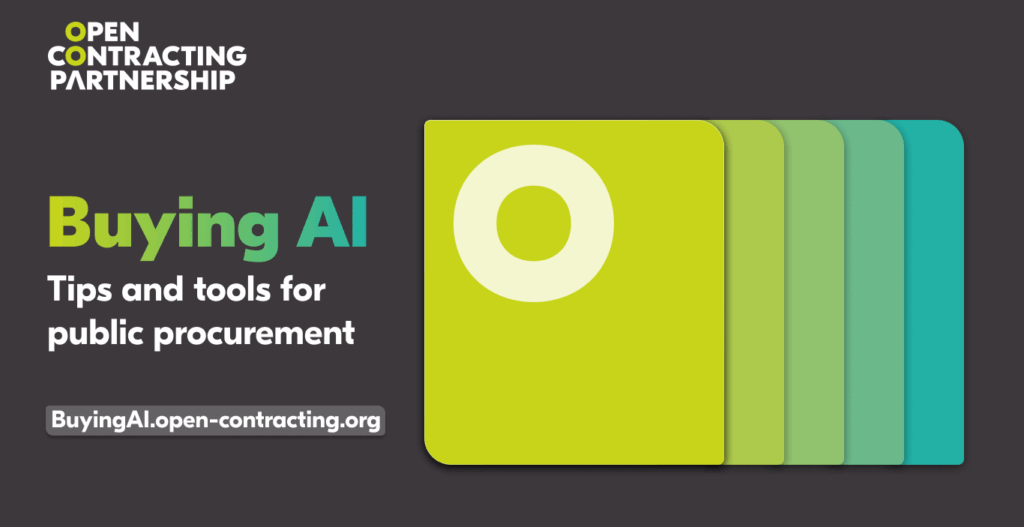Governments risk “expensive failures” without smarter AI procurement, new report warns
WASHINGTON, D.C. — As artificial intelligence races into public sector systems worldwide, a new report from the Open Contracting Partnership (OCP) warns that governments risk wasting taxpayer money and eroding public trust unless they overhaul how they buy and govern AI.
The report, Buying AI: Tools and Tips for Public Procurement,” is the first practical global guide designed to help procurement officials, project teams, and technology leaders responsibly source and deploy AI tools. Drawing on interviews and workshops with more than 50 public practitioners and experts, it identifies the top pitfalls in AI purchasing and offers concrete, actionable steps for governments to get it right.
“Poor AI procurement can cost governments millions, not just in failed projects, but in lost public trust,” said Kathrin Frauscher, OCP’s Deputy Director. “Done right, though, it can modernize services, boost efficiency, and prove that governments can use emerging technology responsibly. This guide gives public institutions a practical roadmap to do exactly that, turning AI’s potential into measurable results for the people they serve.”
As governments rush to adopt generative and agentic AI to boost efficiency, OCP’s research finds that enthusiasm far outpaces readiness. Many agencies are buying off-the-shelf AI tools without the expertise to vet vendor claims, pricing, or in-house capacity to integrate and manage them, while cautious approval processes often slow innovation even for low-risk projects. The result is a growing gap between AI’s promise and the public sector’s ability to deliver it.
The report spotlights how some governments are using agile, collaborative procurement to make AI adoption safer and more effective.
- In Australia, the Digital Transformation Agency (DTA) created one of the world’s most robust frameworks for responsible AI in government– including policies, technical standards, and model contract clauses. Instead of publishing them as static documents, DTA embedded its guidance directly into the government’s Digital Marketplace so buyers encounter best practices while sourcing technology. The policies are kept “live” and regularly updated to reflect new developments. Still, DTA notes that agencies often bring procurement and technical teams in too late, causing delays that better collaboration could prevent. The lesson is to start small with low-risk pilots to build experience and confidence before scaling.
- In the United States, the Centers for Medicare & Medicaid Services (CMS) has shown how outcome-driven contracting can save money and accelerate innovation. Partnering with Skyward IT Solutions, CMS procured AI and machine-learning services that modernized operations, including a chatbot that reduced ticket creation time from 20 minutes to one, and a procurement analysis tool now saving the agency about $3 million per month. By using an open, challenge-based process that focused on outcomes rather than prescribing solutions, CMS enabled its vendor to adapt to fast-moving AI capabilities. The approach worked, but also underscored the need for greater AI literacy across government. As the report highlights, public agencies must empower vendors to innovate while maintaining rigorous oversight.
- Chile’s national digital agency created an internal “sandbox” to test and verify vendor claims before full-scale deployment. Together, these cases show that when governments pair flexibility with accountability, AI can be a force for measurable public value.
“Governments are racing to adopt AI, but too often they’re doing it without the preparation and guardrails to make those investments succeed,” said Kaye Sklar, Senior Program Manager for Content and Insights at OCP and one of the report’s authors. “Public agencies are under pressure to ‘get into AI,’ but without strong procurement practices, they risk buying expensive tools that don’t work, don’t get used, or even undermine public confidence.”
The Buying AI guide lays out practical steps for governments to strengthen procurement readiness and plan AI adoption more strategically. It urges procurement officials to embrace agile, outcome-based contracting, collaborate early with key stakeholders across the government, and push for clear, plain-language documentation.
Read the full report: Buying AI: Tools and Tips for Public Procurement at https://buyingAI.open-contracting.org

Media contact
Georg Neumann
Head of Communications